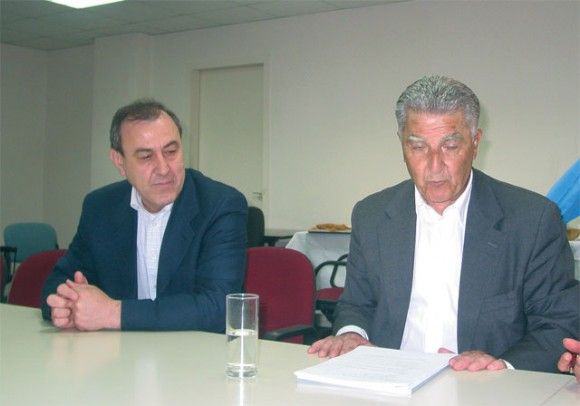Research Institute Foresees Tourism Arrival Increases
Tourism arrivals in Greece are set to rise by 5 to 7 percent this year, according to estimates by the Institute of Tourism Research and Forecasts. In its latest “Economy and Tourism” report, ITEP predicts that in 2005 foreign tourist arrivals will rise by 5 to 6 percent over last year.
The survey found that prospects for 2005 are better for three reasons: The Olympics and the successful advertising campaign have promoted Greece well; Athens has had a decent facelift; and Turkey cannot increase its arrivals as it exhausted its accommodation potential last year with a 27 percent rise.

Lucas Duvas, manager of the Attica Hoteliers Association, with Professor Panayiotis Pavlopoulos, director of the Tourism Studies Institute.
Professor Panayiotis Pavlopoulos, director of the Tourism Studies Institute, said last year was good only for tourism foreign currency revenues, which rose by 9 percent. This was entirely due to the Olympic Games, with prices and hotel occupancies rising in Athens and possibly in Thessaloniki, he suggested. On the contrary, the countryside has suffered a decline of up to 5 percent in overnight stays, while prices not only did not follow inflation but fell.
Professor Pavlopoulos believes that tourism this year will increase by 6 percent based on qualitative analyses, as sufficient quantitative data are not available yet.
He said that the country’s positive image internationally, after the successful staging of the Olympic Games, has improved further, thanks also to the impressive promotional program undertaken by the tourism ministry. It is estimated to have been the most successful campaign, both in terms of quality and quantity, for many years, costing some 30 million euros.
As well, he said, the intensive advertising campaign should encourage many of its traditional visitors to return, those who in the last four years had turned to other destinations. Advertising, however, said the professor, may have a temporary impact that will only become permanent through continual improvements in tourism infrastructure, starting with the poor road network all the way down to taxi drivers who prey on unsuspecting tourists.
In the western Peloponissos, he added, some luxurious hotel units have been brought to market, a number of which have received international awards. However, tourists visiting them must first land at the third-class Araxos airport, where charters land, and then navigate country roads.
Furthermore, he said, our main rival market, Turkey, and to a certain extent Egypt, are having problems. After its massive rise in tourist arrivals over the last few years (27 percent in 2004), Turkey has exhausted its potential, while Egypt has security worries.
Nevertheless, Professor Pavlopoulos is not as optimistic when it comes to revenues from tourism. He suggests, as hoteliers complain, that the steep discounts offered this year will definitely lead to reduced revenues for each visitor. The average revenue per tourist could be lower than last year, so the rise in tourist numbers is not certain to bring in more foreign currency.
The successful campaign is therefore a very positive development, but, as experienced hoteliers note, our tourism industry’s problem is not a lack of appropriate marketing but rather its structural weaknesses. Tourism enterprises operate under high-cost conditions, being burdened by the highest non-salary costs in Europe (employer contributions to the Social Security Foundation and the Hotel Employees’ Fund), while inflexibility in the jobs market, in a sector characterized by dramatic seasonal shifts in working hours, is the biggest obstacle for its competitiveness.
For the official optimism to prove valid and for tourism to regain its strength and propel the economy forward, the government will have to follow a consistent policy of eliminating profiteering.




